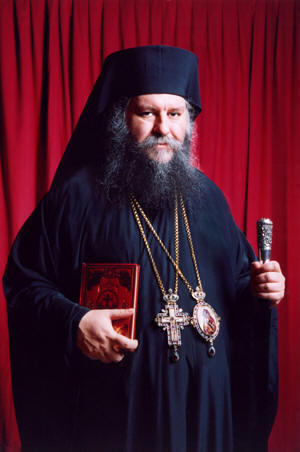![andrei]() The following was written concerning the recent union from Abp Andrew, Bishop of the American Diocese of ROAC and is published, as always, in the public interest.
The following was written concerning the recent union from Abp Andrew, Bishop of the American Diocese of ROAC and is published, as always, in the public interest.
About the recent merger of the Synod in Resistance, the GOC, and the ROCOR(A)
APOSTOLIC CANON 46
We order any Bishop or Priest, that has accepted any heretic’s baptism or sacrifice (eucharist) be deposed; for “what consonance has Christ with Belial? Or what part has the believer with an unbeliever?”
APOSTOLIC CANON 47
If a Bishop or Priest baptize anew anyone that has had a true baptism, or fail to baptize anyone that has been polluted by the impious, let him be deposed, on the ground that he is mocking the Cross and Death of the Lord and for failing to distinguish priests from pseudopriests.
It seems to me that, based on the two abovecited canons, the Apostles had an expectation that the clergy should be able to tell the difference between where the grace of the Mysteries of the Church was present and effectual, and where it was not.
But here we are not talking about grace in general.
The grace of the Holy Spirit is the life creating force at work in all of creation. Everything that has breath breathes by the grace of the Holy Spirit. His grace is everywhere present and fills all things. Everything that is alive lives by the grace of the Holy Spirit. Birds fly by the grace of the Holy Spirit. Grass moves in the wind by the grace of the Holy Spirit. Fish swim by the grace of the Holy Spirit. He takes the grace of His Spirit away and all things return to their dust. Man, being the crown of creation, is certainly not foreign to the action of this grace, Which is at work in the world to draw all things to Itself. So, in a way, it is fair to say that all men have the grace of the Holy Spirit, just like the rain, which falls on all men, or the sunlight, which illumines all men, good and bad alike.
However, that grace which descended upon the Holy Apostles on Pentecost Day while they were gathered in the locked room (symbolizing the finite borders of the Church), that FULLNESS of grace, the grace of the Church, the grace of the Sacraments, resides only in those upon whom
the Holy Apostles have laid their hands (or their descendants – the bishops). This grace is not common to all men. When a man leaves the Church, he loses this grace. But he is not graceless. But rather, he falls back into the category of those who experience the grace which is common to all. This grace again begins to work on him to draw him back to the Church.
Often, men who experience this general grace, not knowing the difference between these two states (either because they have never tasted the grace of the Church, or because they have lost the ability to distinguish between the two), mistake it for the grace that they read about in the
Scriptures, and they think that what they experience must be the grace of the Church, the grace of the Sacraments. But what they are really experiencing is the grace which moves all men to seek God.
It seems to me that in these recent statements made by these synods, there is really nothing new. No one has repudiated Cyprianism. No one has called it a heresy or repented of it. The basic premise of Cyprianism is that the grace of the Church, the grace of the Sacraments, exists in the True Church as well as in the false “church.” The statement made by the Cyprianite Synod seems to me to be rather vague. The GOC, which has condemned Cyprianism on paper, nevertheless practices it, both in Greece, and in the US. This was the case in the past several years, and is still the case.
All of these men rightly condemn ecumenism. But they fail to see how their imprecise understanding of where the grace of the Church, the grace of the Sacraments, truly resides, and where it is absent, gives reason for the True Orthodox to believe that they have accepted a veiled form of
ecumenism, or cryptoecumenism. This is the essence of Cyprianism. And so, we see another trick of the devil in capturing men’s souls by the error that they think they have eradicated. I have no doubt that they sincerely reject the idea of Cyprianism, but they don’t understand that, although they reject it in word, they continue to practice it in deed.
+Archbishop Andrew,
of Pavlovskoye and Rockland
March 10/23, 2014
 In other former HOCNA news, a barn has been winterized for the large number of monks who left HOCNA for the HOTCA. According to an email sent out by Fr Panagiotes Carras, “Four cars/trucks with trailer went to Holy Ascension Monastery between November 15 to 19 to assist the brotherhood in winterizing a barn for monastics to live. This trip will never be forgotten. We accomplished a great deal in the working days and nights with Gods help. The trip was well organized from beginning to end.”
In other former HOCNA news, a barn has been winterized for the large number of monks who left HOCNA for the HOTCA. According to an email sent out by Fr Panagiotes Carras, “Four cars/trucks with trailer went to Holy Ascension Monastery between November 15 to 19 to assist the brotherhood in winterizing a barn for monastics to live. This trip will never be forgotten. We accomplished a great deal in the working days and nights with Gods help. The trip was well organized from beginning to end.”






